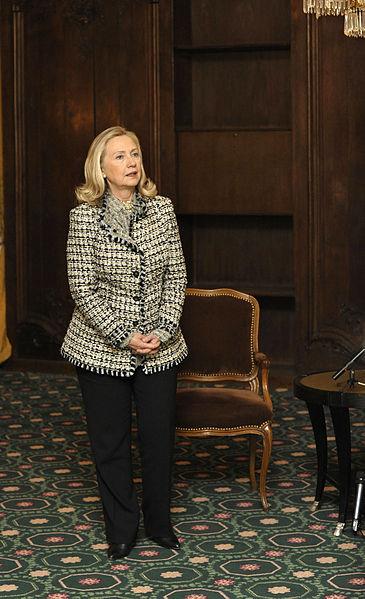By JAMES DEMETRIADES
CONTRIBUTING WRITER

Hillary Clinton recently announced her support of marriage equality, citing constitutional and personal reasons.
Former Secretary of State, former Senator and former First Lady Hillary Clinton has officially come out in support of gay marriage. On Monday, March 18, Clinton released a video through Human Rights Campaign where she not only affirmed her belief that “Gay rights are human rights, and human rights are gay rights,” but went a step further by declaring full support for gay marriage.
The Human Rights Campaign contains 1.5 million members nationally and advocates for the civil rights of members of the lesbian, gay, bisexual and transgender (LGBT) community. Clinton believes that members of the LGBT community are “full and equal citizens and they deserve the rights of citizenship. That includes marriage.”
I am not writing today to debate the merits of gay marriage (of which I personally see both social and constitutional reasons for legality) but rather to explore the reasons and implications behind such a sweeping public statement.
Clinton begins by reminding her audience that her position on gay rights has a foundation in the past, namely by her declaration a year ago to the United Nations that “Gay rights are human rights, and human rights are gay rights.” From this anecdote Clinton extrapolates further on how she worked to promote equality abroad through her post as Secretary of State. This includes “engaging in some tough conversations with foreign leaders, who did not accept that human rights apply to everyone, gay or straight.”
While admittedly the discrimination experienced by LGBT individuals in some other countries is far more extreme, inequality still exists on American soil.
So in addition to starting a tough conversation, Clinton said that she instructed American diplomats to “combat repressive laws and reach out to the brave activists.” On the domestic front she takes personal responsibility for changing state department policy to ensure that “LGBT families are treated more fairly.”
Within the 90 seconds of this six minute speech, Clinton does not make any mention of gay marriage; rather, she touches upon and discusses her experience promoting LGBT rights abroad.
By framing her argument for support of marriage equality and LGBT rights through her foreign affairs experience, she demonstrates clearly her dedication and experience in leading the fight on this tough and controversial issue.
It sounds very much like the beginning of a campaign pitch; she makes a clear list of previous experience and gives background on her history before coming out in support of gay marriage. Many people have speculated since this video has been released that Clinton is gearing up for a 2016 run for the Democratic nomination for the presidency.
Yet, she also makes a personal appeal reflecting on the reasons for her own changing position on this issue. She cites her four years traveling the world as causing her to “challenge [herself] to think anew about whom we are and the value we represent to the world.”
Clinton took a hard stance against discrimination abroad, but now has reevaluated the situation at home. She claims that “for America to continue leading in the world there is work we must do here at home.”
Clinton then references economic and security investigations that must continue to be made, but she also says that we must work as a country to “live up to our highest ideals,” chiefly among these being equality and freedom.
Clinton references the Declaration of Independence, implying that the fight for LGBT rights and equality is part of “our long march to a more perfect Union.”
Her appeal to the United States’ our founding document and also the authority derived from her foreign policy experience creates a compelling case for supporting marriage equality. Clinton supports it as both a matter of “policy and law, embedded in a broader effort to advance equality and opportunity for LGBT Americans and all Americans.”
Clinton has now framed the fight for marriage equality not only as a matter of legal policy, but a matter of universal human rights supported by her both her international and personal experience. She believes that marriage equality is supported by “her devotion to law and human rights and guiding principles of her faith.”
Clinton has now come out vowing to uphold and fight for equality across the nation and the world. This argument is extremely well crafted and it also will be a useful tool for Clinton should she decide to run for President in 2016. Those who contend that she is simply pandering to gain voters are mistaken. Clinton’s record as Secretary of State has demonstrated a reversal of her previous beliefs and a new found dedication to fighting for LGBT rights, including marriage equality. The timing of this declaration comes after she leaves public office as an effort to position herself to be a public leader in the upcoming debate on gay marriage. In her capacity as a private citizen, Clinton can now express her views without needing approval.
She is not pandering to the crowd. She is instead entering a declaration of support and has made the move to become an advocate for equality of citizens of the United States and the world.
Clinton’s detractors are quick to attack her, but the strength and coherency to her appeal of supporting marriage equality is genuine.
Clinton, with this affirmation of support, will continue to be a progressive leader of change and no doubt also a vocal political influence in many national debates, including the fight for marriage equality.
James Demetriades, FCRH ’15, is a history and political science major from Cromwell, Conn.









































































































































































































